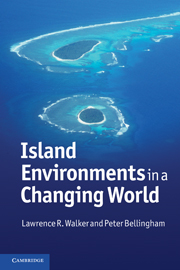Book contents
- Frontmatter
- Contents
- Preface
- Photo credits
- 1 Introduction to island environments and cultures
- 2 The physical setting
- 3 Natural disturbances on islands
- 4 The plants and animals of islands
- 5 Human dispersal, colonization, and early environmental impacts
- 6 Intensifying human impacts on islands
- 7 Islands in the modern world, 1950–2000
- 8 The future of island ecosystems: remoteness lost
- Glossary
- Index
- Plate section
- References
1 - Introduction to island environments and cultures
Published online by Cambridge University Press: 05 June 2012
- Frontmatter
- Contents
- Preface
- Photo credits
- 1 Introduction to island environments and cultures
- 2 The physical setting
- 3 Natural disturbances on islands
- 4 The plants and animals of islands
- 5 Human dispersal, colonization, and early environmental impacts
- 6 Intensifying human impacts on islands
- 7 Islands in the modern world, 1950–2000
- 8 The future of island ecosystems: remoteness lost
- Glossary
- Index
- Plate section
- References
Summary
STEREOTYPES AND REALITIES
Our goal in writing this book is to examine relationships between island environments and people. We explore how these dynamic relationships have changed both the natural history of islands and the interactions between humans and nature. We approach this goal primarily from our perspective as ecologists who have lived and carried out research on islands. Humans both exploit and conserve natural resources, and human culture influences the attitudes of humans toward their environment. Recent surges in human populations on islands and the loss of the historical isolation of islands have removed many traditional restraints to over-exploitation of island resources. As a result, island ecosystems are extremely vulnerable to further damage. If the struggle to reconcile human use of resources and the maintenance of natural systems can be managed on islands, within their limited areas, then models developed here might guide those attempting to restore mainland systems.
Our image of islands is part stereotype, part reality. One popular stereotype is that of an ideal vacation spot. Often included in this idyllic vision are balmy temperatures, gorgeous sandy beaches, crystal-clear, turquoise water, and palm trees fluttering in the warm breezes. Colorfully clad tourists sit in wicker chairs in open-air bars and are served piña coladas by laid-back locals, while sensual music and the muffled sounds of surf fill the air.
- Type
- Chapter
- Information
- Island Environments in a Changing World , pp. 1 - 20Publisher: Cambridge University PressPrint publication year: 2011

